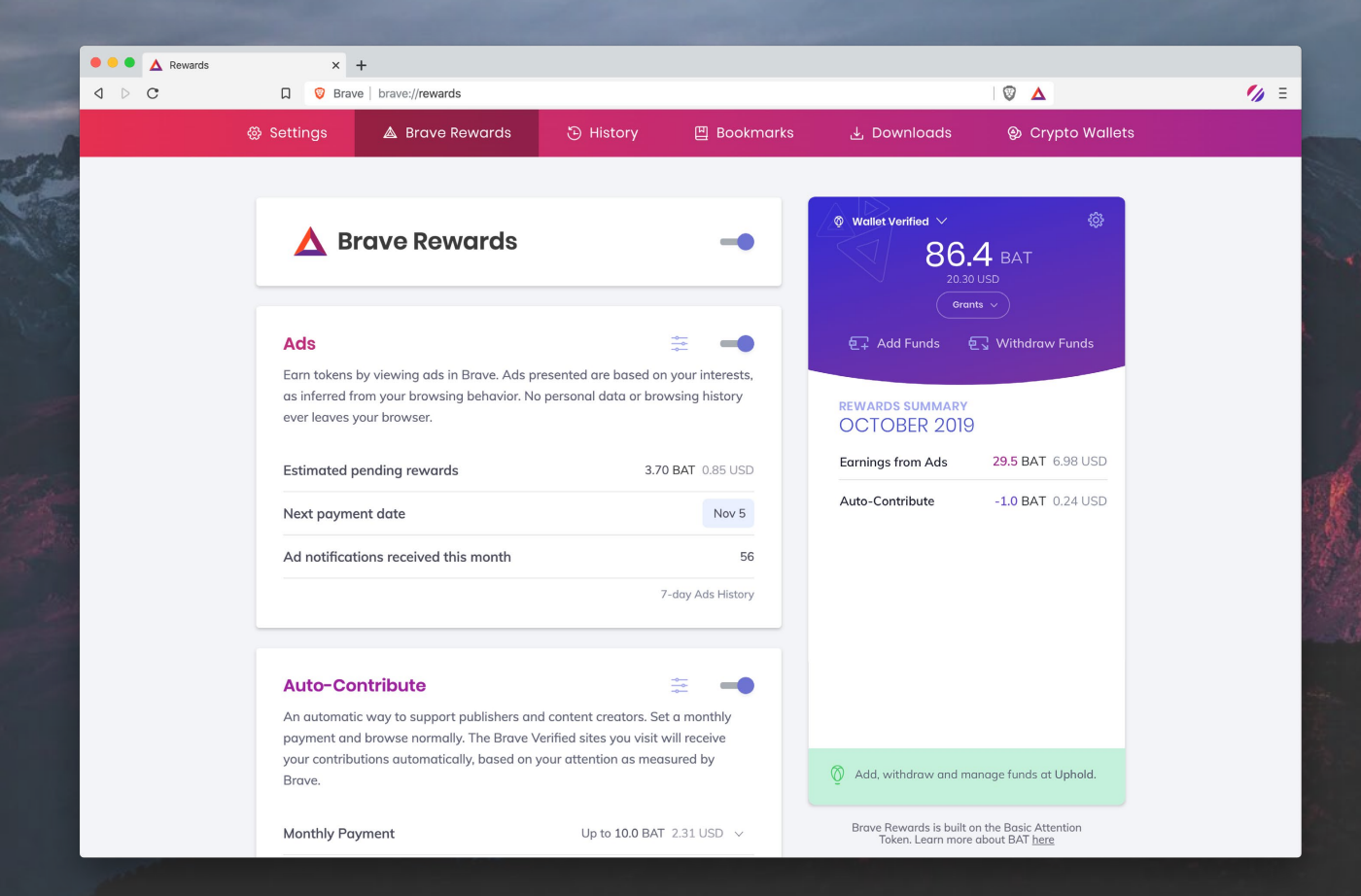Business
Brave launches version 1.0 of its privacy-focused browser

Brave, the company co-founded by ex-Mozilla CEO Brendan Eich after his ouster from the organization in 2014, today launched version 1.0 of its browser for Windows, macOS, Linux, Android and iOS. In a browser market where users are spoiled for choice, Brave is positioning itself as a fast option that preserves users’ privacy with strong default settings, as well as a crypto currency-centric private ads and payment platform that allows users to reward content creators.
As the company announced last month, it now has about 8 million daily users. Its Brave Rewards program, which requires opt-in from users and publishers, currently has about 300,000 publishers on board. Most of these are users with small followings on YouTube and Twitter, but large publishers like Wikipedia, The Washington Post, The Guardian, Slate and the LA Times are also part of the ecosystem. Using this system, which not every publisher is going to like, the browser replaces the ads on a publisher’s site with its own, based on the user’s browsing habits. Users then receive 70 percent of what the advertisers spend on ads, while Brave keeps 30 percent.
As users view these ads, they start earning Basic Attention Tokens (BAT), Brave’s cryptocurrency, which they can keep or give to publishers. In its early days, Brave actually started with Bitcoin as the currency for this, but as Eich noted, that quickly became too expensive (and since the price was going up, users wanted to hold on to the Bitcoin instead of donating it).
Brave also comes with a built-in ad blocker that is probably among the most effective in the industry, as well as extensive anti-tracking features. “Everybody’s bothered by the sense of being tracked and bothered by bad ads,” Eich told me. “But I think ad aesthetics are not the problem. It’s the tracking and the cost of tracking which is multifarious. There’s page load time, running the radio to load the tracking scripts that load the other scripts that load the scripts that load the ads, that drains your battery, too.” Eich argues that with Brave, the team found a way to tie this all together with anti-tracking technology and an approach to ad blocking that goes beyond the industry-standard blocklists and also uses machine learning to identify additional rules for blocking.
 For those users that really want to be anonymous on the web, Brave also features a private browsing mode, just like every other browser, but with the added twist that you can also open a private session through the Tor network, which will make it very hard for most companies to identify you.
For those users that really want to be anonymous on the web, Brave also features a private browsing mode, just like every other browser, but with the added twist that you can also open a private session through the Tor network, which will make it very hard for most companies to identify you.
At its core, Brave is simply a fast, extensible Chromium-based browser. That’s also what the company believes will sell it to users. “The way you get users, […] I think speed is the first one that works across the largest number of users. But you can’t just leave it at speed. You want to have all your benefits tied up in a pretty knot and that’s what we have done,” he said. For Brave, speed and ad/tracking protection are obviously interconnected, and all the other benefits accrue from that.
Looking beyond version 1.0, the Brave team plans to implement better sync, with support for tab and history syncing, for example. Brave also aims to make participating in Brave Rewards an experience with much lower friction for the user. In the early days, before it was on Android, the opt-in rate was around 40 percent, Eich told me, and the team wants to get it back to that.
If you want to give Brave a try, you can download it here.
-

 Entertainment6 days ago
Entertainment6 days agoWhat’s new to streaming this week? (Jan. 17, 2025)
-

 Entertainment6 days ago
Entertainment6 days agoExplainer: Age-verification bills for porn and social media
-

 Entertainment5 days ago
Entertainment5 days agoIf TikTok is banned in the U.S., this is what it will look like for everyone else
-

 Entertainment5 days ago
Entertainment5 days ago‘Night Call’ review: A bad day on the job makes for a superb action movie
-

 Entertainment5 days ago
Entertainment5 days agoHow ‘Grand Theft Hamlet’ evolved from lockdown escape to Shakespearean success
-

 Entertainment5 days ago
Entertainment5 days ago‘September 5’ review: a blinkered, noncommittal thriller about an Olympic hostage crisis
-

 Entertainment5 days ago
Entertainment5 days ago‘Back in Action’ review: Cameron Diaz and Jamie Foxx team up for Gen X action-comedy
-

 Entertainment5 days ago
Entertainment5 days ago‘One of Them Days’ review: Keke Palmer and SZA are friendship goals

















